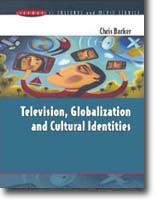 This introductory text examines issues of television and cultural identities in the context of globalization. It is a wide-ranging volume, exploring many of the central cultural issues in contemporary cultural studies, such as media, globalization, language, gender, ethnicity, cultural politics and identity – perhaps the topic of cultural studies over the past decade.
This introductory text examines issues of television and cultural identities in the context of globalization. It is a wide-ranging volume, exploring many of the central cultural issues in contemporary cultural studies, such as media, globalization, language, gender, ethnicity, cultural politics and identity – perhaps the topic of cultural studies over the past decade.
At the core of the book are two critical arguments – that television is a proliferating resource for the construction of cultural identity, and that cultural identity is not a fixed essential ‘thing’ but a contingent social construction to which language is central.
Television, Globalization and Cultural Identities looks are the following questions:
- Are cultural identities socially constructed?
- How are race, nation, sex and gender constructed and represented on television?
- What is the impact of globalization on television and cultural identities?
The book will be essential reading for undergraduate and postgraduate courses on television and cultural identities in the fields of cultural studies, communications, media studies and sociology, with a wider appeal to those with an interest in the television industry. Key concepts are introduced and explained for those new to cultural studies, whilst debates are extended and enriched for those already familiar with them. The text is well structured, links the vocabularies of media studies and cultural studies, and is supported by original case study material.
Chris Barker is Senior Lecturer in Media and Cultural Studies at the University of Wollongong, NSW, Australia. After being awarded a doctorate by the University of Leeds, centred on television drama, Chris Barker taught for a number of years in secondary schools, colleges and higher education institutions in the UK, including the University of Humberside and the University of Wolverhampton. His current interests are in language, identity and global media.
As an introduction to cultural studies, with very clear capsule reviews of complex interdisciplinary literature, it will be a useful supporting text for many cultural geography courses. As a focus on key debates about identity and cultural politics this book is highly successful.
![]()